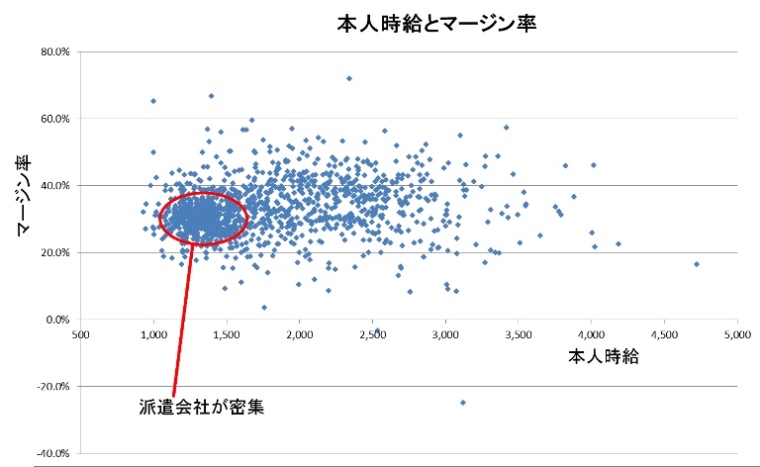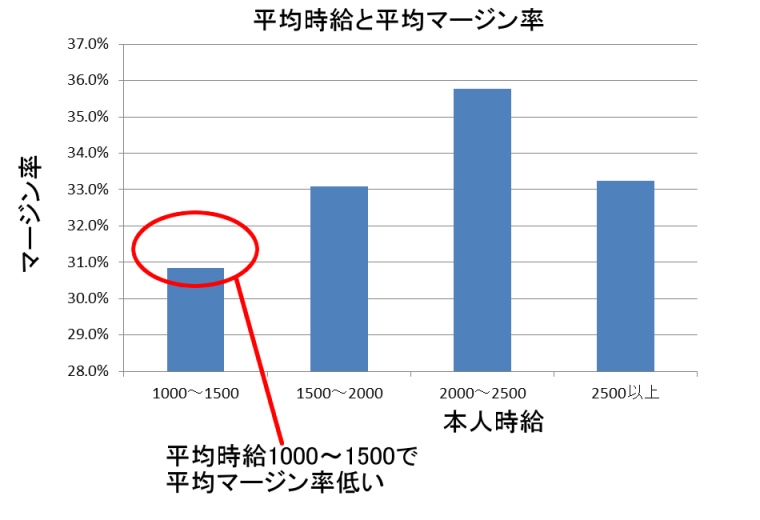December 2022 2nd issue: Recommendations for value-added management of temporary staffing companies
Look at the situation. See reality and understand its essence. First of all, let's understand the situation in which we are placed and think about the cause and reason.
In order to respond appropriately to things, it is important to first see the reality and understand its essence.
Hourly Wage and Margin Rate of Workers at Temporary Staffing Companies in Aichi Prefecture (Graph 1)
Here, let's look at the graph of the average hourly wage and margin rate of workers at temporary staffing agencies in Aichi Prefecture. I chose Aichi Prefecture for this survey because it is the hometown of Tamatsu Lab. If you live in a different area, please check the data for that area. I checked the data from the Ministry of Health, Labor and Welfare's comprehensive website for human resources services, and the websites of individual temporary staffing agencies. Temporary staffing companies are obliged to disclose information on their initiatives related to margin rates and education and training, but some temporary staffing companies were unable to find such data. It is said that there are more than 3,500 dispatch offices in Aichi Prefecture, but only about 1,200 valid data were obtained. Now, let's take a look at the current situation of dispatch companies in Aichi Prefecture.
Average hourly wages and margin rates vary depending on the business operator, but it can be seen that the data is concentrated at around 1300 to 1400 hourly wages and margin rates of around 30%. In other words, there are a large number of temporary staffing companies with an hourly wage of around 1,300 to 1,400 and a margin rate of around 30%.

Graph 1 Average hourly wage and margin rate
Average Hourly Wage and Average Margin Rate of Staffing Agencies in Aichi Prefecture (Graph 2)
Next, we grouped the temporary staffing agencies by hourly wage and calculated the average margin rate for each group. Specifically, I compared the average margin rate for each of the groups with an hourly wage of 1000 to 1500, an hourly wage of 1500 to 2000, an hourly wage of 2000 to 2500, and an hourly wage of 2500 or more.
Looking at this graph 2, you can see that the average margin rate is the lowest at the average hourly wage of 1000 to 1500.

Graph 2 Average hourly wage and average margin rate
The reason why the average margin rate is low in the lowest average hourly wage group (average hourly wage 1000-1500)
Why is the average margin rate low in the lowest average hourly wage group, average hourly wage 1000-1500?
This group overlaps with the area in Graph 1 where temporary staffing companies are concentrated (about 1300 to 1400 per hour, margin rate around 30%). In other words, it is an area where the number of temporary staffing agencies is very large and the competition is fierce. So why are there so many temp agencies in this area?
A major factor is that this area is “easy to enter.” Low hourly wage jobs do not require special skills. So, even if you don't check the career and skills of the temporary staff in detail, if you take the person who applied for the job to the company where you are dispatched, you will get a job. Therefore, it is easy for temporary staffing agencies that simply throw people who come to apply to the company to which they are dispatched to work, with little added value. When such temporary staffing agencies are concentrated, they tend to run into a "bargain competition" because they cannot differentiate themselves. In other words, competition at low dispatch fees is likely to intensify.
Looking at the individual data, some of the major staffing agencies have fairly low margins in this area. If major temporary staffing companies start with a low margin rate, other small and medium-sized temporary staffing companies will also have to lower their staffing fees, resulting in a lower average margin rate.
Recently, it is said that low-wage jobs are not attracting people due to the effects of the weak yen and the shortage of human resources. Although the dispatch fee is low, people do not gather with low wages. In that case, the temporary staffing company will have to reduce the margin rate in order to secure human resources.
Temp agencies aren't the only ones competing in this lowest average hourly wage group. In some cases, the company to which the trainee is dispatched uses a foreign technical intern trainee system. If the dispatched workers do not have higher abilities than the technical intern trainees, the evaluation of the temporary staffing agency will go down. In other words, foreign technical intern trainees may put downward pressure on dispatch fees. On the other hand, due to the introduction of equal pay for equal work, it is no longer possible to keep temporary workers working at very low wages. In addition, when prices rise, dissatisfaction with the wages of dispatched workers increases. For foreign workers, dissatisfaction with wages increases when the yen weakens. In addition, with the spread of the Internet, workers are now able to freely choose a temporary agency.
Due to this situation, it is thought that the group with the lowest average hourly wage (average hourly wage 1000-1500) is likely to experience intensified competition and low margins.
The future of dispatch companies with an average hourly wage of 1,000 to 1,500
What will happen to dispatch companies with an average hourly wage of 1,000 to 1,500 in the future?
In the future, it is conceivable that simple work will decrease due to management reforms of the companies to which dispatched workers are dispatched. It is said that simple work with low wages will decrease in the future due to the promotion of robotization and DX. If the temporary staffing agencies are densely packed and the number of jobs decreases, the competition will become even tougher.
In the future, further pressure to raise wages is expected due to strict enforcement of equal pay for equal work and revisions to the Dispatch Law. Temporary staffing companies that continue to keep workers at low wages will likely continue to face stronger winds in the future.
Perhaps some of the major temporary staffing agencies have already implemented internal business reforms, and may have become a corporate structure that can secure profits even with a low margin rate. In the future, even small temporary staffing companies will be forced to lower their margins.
In general, the group with the lowest average hourly wage (average hourly wage of 1,000 to 1,500) is expected to see further reductions in margins due to intensifying competition.
It may be a harsh way of saying it, but "Just a temporary staffing agency" with no added value in management will disappear if things continue as they are.
So what do we do? How should staffing companies survive in the future?
Management Reform (1) Securing profits by reducing business management costs
First of all, let's become a corporate structure that can make a profit even with a low margin rate, such as by converting to DX.
For example:
a) Attendance management
b) Dispatch business management
c) Sales/Public Relations/Contract/Labor Agreement Management
d) Recruitment and personal information management
e) Personnel evaluation/career/education management
f) Management of various documents such as invoices, salaries, social insurance, etc.
Let's aim to create a structure that will not lose to price competition by reviewing the entire business and working to thoroughly reduce business management costs.
Management reform (2) Thorough value-added management
In order not to be involved in mere price competition, it is effective to add value as a company. Added value means providing a valuable service to the client company. Let's add value through the efforts and ingenuity of the management and make a difference to other temporary staffing companies.
a) Show off your company's presence by specializing in a specific industry
b) Inspire contingent workers to learn and increase their value
c) Let's improve the attractiveness of the company by promoting the acquisition of qualifications
d) Let's work on improving the mentality and motivation of temporary employees
e) Adopt a sales style that is chosen by better dispatch companies
f) Let's get into the system of the dispatched company and contribute to business improvement
g) Let's work on improving the self-appeal power of temporary employees
In order to become a temporary staffing company that is required by the companies that we dispatch staff to, let's add value thoroughly and sharpen ourselves.
Value-added management is important to avoid being caught up in competition with low dispatch fees. If we continue our value-added management, we will be able to compete with higher dispatch fees. Let's raise the existence value of the company with the ingenuity and effort of the management.
* Recommendations for value-added management of temporary staffing companies (PDF file)
*Return to Topics




